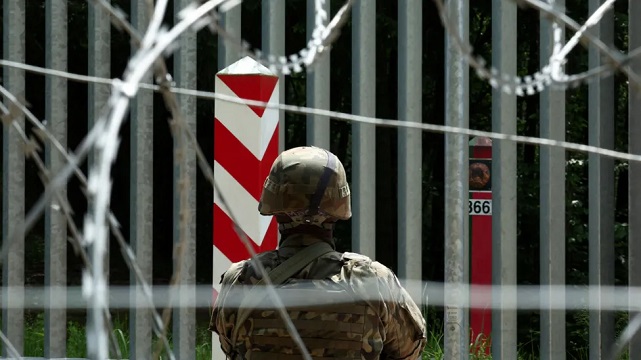
Poland’s parliament has approved controversial proposals to decriminalise in certain circumstances the use of firearms by border guards in self-defence.
NGOs say the legal changes contravene human rights standards, but the government says they are needed to protect Poland’s border with Belarus from increasingly aggressive gangs of migrants.
Last month, a 21-year-old soldier died after he was stabbed trying to prevent migrants enter the country illegally.
Warsaw accuses Belarus of encouraging Asian and African migrants to enter Poland illegally to destabilise the European Union.
Poland’s new pro-EU government had promised a more humanitarian approach to the migrant crisis.
Instead, following the soldier’s stabbing, it re-established a temporary border exclusion zone that hinders public oversight because journalists and NGOs must request passes to enter the area.
According to Deputy Interior Minister Maciej Duszczyk, 13 border protection officers have suffered permanent health damage following attacks by migrants since the crisis began three years ago.
Mr Duszczyk said officers would only be exempt from criminal liability if they use their weapons in response to a direct assault to protect colleagues’ lives.
“I would like to resolve any doubts about the excessive nature of these provisions,” he wrote in response to concerns raised by the Council of Europe’s Commissioner for Human Rights, Michael O’Flaherty.
Mr O’Flaherty and other human rights’ organisations urged MPs to reject the proposals saying they contravene human rights’ standards.
He said the new rules may remove the disincentive for border patrols to use excessive force.
“It may also lead to a situation where the circumstances in which the arbitrary use of force or firearms by state agents may result in the loss of life or bodily harm are not properly investigated, particularly in cases where the victims are on the other side of the border,” he wrote in a letter to the Polish authorities.
The public seems to support Prime Minister Donald Tusk’s tough stance on border security, with one poll last month finding 86% support for allowing soldiers to use their weapons to repel attacks by some migrants.

Poland’s Prime Minister Donald Tusk (Image: EPA)
Many reacted angrily last month when the media revealed that three soldiers patrolling the border had been detained and handcuffed after they fired more than forty warning shots towards a group of migrants who were breaking through the border fence.
Shortly afterwards, Mr Tusk announced plans to re-introduce the exclusion zone banning unauthorised people to enter part of the border and change the law on the use of firearms.
Mr O’Flaherty appealed in a separate letter to Mr Tusk to stop the practice of migrant pushbacks, saying 7,317 people had been summarily returned to Belarus, in some cases after they had requested asylum in Poland, between December 2023 and June 2024.
In response, Mr Duszczyk said: “I consider returning the migrants to the Belarusian side immediately after crossing the border as a proportionate reaction.”
He said migrants who asked for international protection were not being returned.
NGOs estimate 130 migrants have died in the border zone in Belarus and its three EU neighbours, Poland, Lithuania and Latvia in the last three years, many succumbing to exposure in sub-zero temperatures or drowning in marshy areas.
Mr Duszczyk said the new government has assumed “zero deaths at the border” as a principle, adding that 1,319 migrants who entered Poland illegally in the last three years have been treated in Polish hospitals.
He said non-permanent intervention teams created in February to search for people who have got lost in forests and swamps have helped 84 people.
Source: bbc.co.uk






Be the first to comment